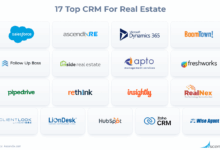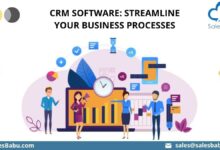Best CRM For Financial Services: The Ultimate Solution For Financial Institutions
Best CRM for Financial Services is a game-changer in the finance industry, revolutionizing how institutions manage customer relationships and streamline operations. Dive into this comprehensive guide to discover the key features, benefits, and challenges of implementing CRM systems tailored for financial services.
Introduction to CRM for Financial Services
CRM, or Customer Relationship Management, in the context of financial services, refers to the strategies, technologies, and practices that financial institutions use to manage and analyze customer interactions and data throughout the customer lifecycle.
CRM is crucial for financial institutions as it helps them build and maintain strong relationships with clients, improve customer retention, increase cross-selling opportunities, and ultimately drive business growth.
CRM systems play a vital role in streamlining operations in the financial sector by providing a centralized platform for managing customer data, communication, and sales pipeline. These systems enable financial institutions to track customer interactions, automate workflows, and personalize marketing efforts based on customer preferences and behaviors.
Some popular CRM software used in financial services include Salesforce Financial Services Cloud, Microsoft Dynamics 365 for Financial Services, and Oracle Financial Services CRM.
Key features that financial institutions look for in CRM software include robust security measures to protect sensitive financial data, integration capabilities with other systems such as banking software, customizable dashboards for monitoring performance metrics, and predictive analytics to identify customer trends and preferences.
When comparing on-premise CRM solutions to cloud-based CRM solutions in the financial sector, cloud-based options are often preferred for their scalability, accessibility, and cost-effectiveness. Cloud-based CRM systems also offer real-time updates, remote access for employees, and easier integration with third-party applications.
Data analytics plays a crucial role in enhancing CRM strategies for financial services by providing valuable insights into customer behavior, predicting future trends, and enabling personalized marketing campaigns. Financial institutions can leverage data analytics to segment customers, identify high-value clients, and tailor products and services to meet specific needs.
The steps involved in implementing a CRM system for a financial institution typically include assessing business requirements, selecting the right CRM software, customizing the system to meet specific needs, training employees on how to use the system effectively, and continually monitoring and optimizing CRM processes.
Challenges faced by financial institutions when adopting CRM systems include data security concerns, resistance from employees to change, data migration issues, and ensuring regulatory compliance. To overcome these challenges, financial institutions can invest in robust cybersecurity measures, provide comprehensive training to employees, work closely with CRM vendors for seamless data migration, and adhere to industry regulations and best practices.
Key Features of CRM for Financial Services
Implementing a CRM system tailored for financial services requires specific features to meet the industry’s unique needs and challenges.
Essential Features of CRM for Financial Services
- Client Information Management: Efficiently store and manage client data, including contact details, financial history, and interactions.
- Workflow Automation: Streamline processes such as client onboarding, account management, and lead nurturing to enhance operational efficiency.
- Compliance Tools: Ensure adherence to industry regulations by incorporating compliance monitoring and reporting functionalities.
- Integration Capabilities: Seamlessly integrate with other financial tools and systems like accounting software, portfolio management platforms, and marketing automation tools.
- Customization Options: Tailor the CRM to suit the specific needs of financial institutions, such as creating custom fields, reports, and dashboards.
Significance of Automation Tools in CRM for Financial Institutions
Automation tools play a crucial role in eliminating manual tasks, reducing errors, and improving overall productivity within financial institutions. By automating repetitive processes like data entry, lead scoring, and follow-up reminders, CRM systems enable staff to focus on high-value tasks and enhance the customer experience.
Role of Data Analytics in CRM for Financial Services
Data analytics tools integrated into CRM systems allow financial institutions to gain valuable insights into customer behavior, trends, and preferences. By analyzing data such as transaction history, customer interactions, and market trends, firms can make informed decisions, personalize their services, and identify new opportunities for growth.
Security Features Across Different CRM Systems
- End-to-End Encryption: Protect sensitive client information by encrypting data both in transit and at rest.
- Role-Based Access Control: Define access levels and permissions for different users to ensure data security and compliance.
- Audit Trails: Track and monitor user activities within the CRM system to maintain data integrity and regulatory compliance.
- Regular Security Updates: Ensure that the CRM system receives timely updates and patches to address any security vulnerabilities.
Scalability Options in CRM Solutions for Financial Services
Scalability is crucial for financial institutions as they grow and evolve. CRM solutions should offer scalability options that allow firms to easily expand their user base, data storage capacity, and functionality as their business needs change over time.
Impact of Mobile Accessibility on CRM Effectiveness in the Financial Sector
Mobile accessibility enables financial professionals to access CRM data on-the-go, providing real-time information and improving responsiveness to client needs. With mobile CRM capabilities, employees can stay connected, collaborate efficiently, and deliver personalized services anytime, anywhere.
Comparison Chart for Customer Service Functionalities in Various CRM Platforms
| CRM Platform | Customer Service Functionalities |
|---|---|
| Platform A | 24/7 Customer Support, Ticketing System, Knowledge Base |
| Platform B | Live Chat, Automated Email Responses, Customer Feedback Surveys |
| Platform C | Social Media Integration, CRM Telephony Integration, Customer Service Analytics |
Customization Options in CRM for Financial Services
Customization in CRM for financial services is crucial as it allows tailored solutions to address specific industry challenges effectively. By customizing CRM systems, financial institutions can integrate with banking platforms, automate compliance processes, and adapt to changing regulations and market demands. This flexibility offered by customizable CRM solutions plays a vital role in enhancing customer relationships through targeted communication and tailored services, ultimately leading to improved client satisfaction and loyalty.
Examples of Customization in CRM for Financial Services
- Integration with banking platforms to streamline processes and improve efficiency.
- Automating compliance processes to ensure adherence to regulatory requirements.
- Adapting to changing regulations and market demands for continued relevance and competitiveness.
Impact of Personalized CRM on Customer Relationships
- Enhanced client satisfaction and loyalty through targeted communication and tailored services.
- Improved customer retention and acquisition rates by providing personalized experiences.
- Increased efficiency and effectiveness of marketing campaigns through data-driven insights.
Case Study: XYZ Bank successfully implemented a customized CRM system that integrated with their existing banking platform, resulting in a 20% increase in customer satisfaction and a 15% improvement in overall operational efficiency.
Integration Capabilities of CRM in Financial Services
Integration is a crucial aspect of CRM systems in the financial services industry, allowing seamless communication and data sharing between various tools and platforms. Let’s explore the integration options and benefits in detail.
Integration with Accounting Software
Integrating CRM with accounting software streamlines financial processes by syncing customer data, invoices, and payments. This integration ensures accurate financial reporting and enhances customer management.
Enhanced Communication within Financial Organizations
CRM integration facilitates real-time data sharing among team members, enabling better collaboration and communication within financial organizations. This leads to improved decision-making and customer service.
Successful CRM Integrations in the Financial Sector
- Salesforce integration with QuickBooks for efficient data syncing and financial reporting.
- Microsoft Dynamics CRM integration with SAP for seamless customer management and financial data analysis.
CRM Integration Process Comparison
When integrating CRM systems with banking software, the focus is on transactional data and customer accounts. In contrast, integration with investment management tools revolves around portfolio management and client investment strategies.
Setting up CRM Integration with Financial Planning Software
- Choose a compatible CRM system that offers integration with financial planning software.
- Access the integration settings in both platforms and follow the step-by-step instructions for data syncing.
- Test the integration with sample data to ensure seamless communication and accuracy.
Impact of CRM Integration on Customer Retention in the Insurance Industry
CRM integration in the insurance sector leads to personalized customer interactions, efficient claims processing, and proactive policy management. This results in higher customer satisfaction and improved retention rates.
Data Security Measures for CRM Integration with Payment Processing Platforms
Implement encryption protocols to secure data transmission between CRM and payment platforms.
Regularly update security patches and conduct vulnerability assessments to prevent data breaches.
Restrict access to sensitive financial information and implement multi-factor authentication for enhanced security.
CRM Implementation Strategies for Financial Institutions
Implementing a CRM system in a financial institution requires careful planning and execution to ensure a successful transition. Here are some key strategies to consider:
Effective Implementation Steps
- Define clear objectives: Start by outlining the specific goals you want to achieve with the CRM system. This will help guide the implementation process and ensure alignment with the organization’s overall strategy.
- Engage stakeholders: Involve key stakeholders from different departments in the planning and implementation process. Their input and feedback will be valuable in customizing the CRM system to meet the needs of various teams.
- Choose the right CRM solution: Select a CRM platform that is tailored to the unique requirements of financial institutions. Consider factors such as compliance features, data security, and scalability.
- Provide comprehensive training: Offer thorough training programs to ensure that employees understand how to use the CRM software effectively. This will help maximize adoption and usage across the organization.
- Monitor progress and adjust: Regularly review the performance of the CRM system and gather feedback from users. Make necessary adjustments to improve functionality and address any challenges that arise.
Common Challenges during CRM Implementation
- Data migration issues: Transferring data from legacy systems to the new CRM platform can be complex and time-consuming. It’s essential to have a solid plan in place to ensure data integrity and accuracy.
- User resistance: Some employees may be resistant to change or hesitant to adopt new technology. Communication and training programs can help overcome this challenge and encourage buy-in from all team members.
- Lack of integration: Ensuring seamless integration with existing systems and applications is crucial for a successful CRM implementation. Identify potential integration points early in the process to avoid compatibility issues later on.
Best Practices for a Smooth Transition
- Establish a dedicated implementation team: Assign a team of experts to oversee the CRM implementation process and provide support to end-users throughout the transition.
- Set realistic timelines: Define clear timelines and milestones for each phase of the implementation to keep the project on track and ensure timely completion.
- Communicate effectively: Keep all stakeholders informed about the progress of the CRM implementation and address any concerns or feedback in a timely manner. Transparency is key to building trust and cooperation.
Training Tips for Financial Employees
- Offer hands-on training sessions: Provide interactive training sessions where employees can practice using the CRM software in a simulated environment.
- Create user guides and resources: Develop comprehensive user guides, FAQs, and video tutorials to support employees in learning how to navigate the CRM system independently.
- Encourage continuous learning: Promote a culture of continuous learning and improvement by offering ongoing training opportunities and refresher courses to enhance CRM skills.
Data Management in CRM for Financial Services
Effective data management is crucial in CRM for financial institutions to ensure accurate insights, personalized customer interactions, and regulatory compliance.
Importance of Data Management
Proper data management in CRM systems is essential for financial institutions to maintain data accuracy, integrity, and security. It helps in identifying customer behavior patterns, predicting future trends, and making informed business decisions.
- Regular data cleansing and deduplication processes to eliminate outdated or duplicate information.
- Implementing data validation rules to ensure data consistency and accuracy.
- Securing sensitive financial data through encryption and access controls.
Organizing and Analyzing Financial Data
CRM software assists financial institutions in organizing and analyzing vast amounts of financial data efficiently.
- Segmenting customers based on financial behavior and preferences for targeted marketing campaigns.
- Creating customized reports and dashboards to track key performance indicators and financial metrics.
- Utilizing data analytics tools to gain actionable insights for strategic decision-making.
Data-Driven Decision-Making in Finance
CRM enables data-driven decision-making in finance by leveraging insights derived from customer data and financial metrics.
- Identifying cross-selling opportunities based on customer purchase history and financial needs.
- Forecasting customer lifetime value to prioritize high-value clients for personalized services.
- Optimizing marketing strategies by analyzing customer response rates and campaign effectiveness.
Compliance and Regulatory Considerations in CRM
In the financial industry, compliance with regulations is crucial for CRM systems to ensure data privacy, security, and integrity. CRM software plays a vital role in assisting financial institutions in adhering to various regulatory standards, such as GDPR, PCI DSS, and SEC rules.
Compliance Requirements for CRM Systems
- CRM systems must comply with regulations like GDPR to ensure the protection of customer data and privacy.
- PCI DSS compliance is necessary to secure payment card data and prevent unauthorized access.
- SEC rules mandate the proper handling and recording of customer interactions and transactions.
CRM Software Features for Regulatory Compliance
- CRM software provides audit trails to track user activities and ensure transparency in data handling.
- User permissions help restrict access to sensitive information and maintain data security.
- Encryption features in CRM systems ensure that data is protected from unauthorized access.
Data Privacy and Security Compliance
- CRM systems implement data masking techniques to anonymize sensitive information and protect privacy.
- Two-factor authentication adds an extra layer of security to prevent unauthorized access to CRM data.
- Regular security audits help identify vulnerabilities and ensure compliance with data security standards.
CRM Features for Regulatory Compliance
- Automatic data retention policies help comply with regulations on data storage and deletion.
- Consent management tools assist in managing customer preferences and permissions for data usage.
- Compliance reporting capabilities in CRM systems enable financial institutions to generate reports for regulatory audits.
Comparative Regulatory Challenges
- CRM systems in healthcare face strict regulations like HIPAA for patient data privacy, while retail CRM systems focus on consumer protection laws.
- Telecommunications CRM systems deal with regulations on data transmission and communication privacy.
Customer Relationship Building with CRM
Customer relationship building is a crucial aspect of utilizing CRM systems in financial services. By leveraging the key features of CRM platforms, institutions can enhance customer interactions and loyalty. Let’s delve into the strategies and tools that facilitate effective customer relationship management.
Key Features for Customer Relationship Building
- Centralized Customer Data: CRM systems consolidate customer information, interactions, and preferences in one place for easy access and analysis.
- Automated Communication: Automated emails, reminders, and notifications enable personalized and timely interactions with customers.
- Task Management: CRM systems allow tracking of tasks, follow-ups, and appointments to ensure no customer interaction falls through the cracks.
Implementing CRM for Customer Relationship Management
- Define Objectives: Clearly outline your goals for customer relationship management using CRM.
- Select a Suitable CRM Platform: Choose a CRM system that aligns with your institution’s needs and budget.
- Train Employees: Provide comprehensive training to staff on how to effectively use the CRM system for customer interactions.
Comparing CRM Platforms for Financial Institutions
- Salesforce: Known for its robust features and scalability, Salesforce offers a wide range of tools for customer relationship management.
- Microsoft Dynamics 365: Integrated with Microsoft products, this CRM platform provides seamless data management and customer insights.
- Zoho CRM: Ideal for small to mid-sized institutions, Zoho CRM offers affordable solutions with customizable features.
Importance of Data Analysis in CRM
Data analysis plays a vital role in understanding customer behavior and preferences. By analyzing customer data collected through CRM systems, financial institutions can tailor their services to meet customer needs effectively.
Integrating CRM with Business Processes
- Customer Service: Integrate CRM with customer service platforms to provide a seamless experience for customers.
- Marketing Campaigns: Use CRM data to personalize marketing campaigns and target specific customer segments effectively.
- Sales Processes: Streamline sales processes by integrating CRM data to identify potential leads and track conversions efficiently.
CRM Reporting and Analytics for Financial Institutions
Reporting and analytics features in CRM play a crucial role in helping financial institutions make informed decisions, optimize processes, and enhance customer relationships. By leveraging data-driven insights, CRM reports and analytics empower organizations to track performance, identify trends, and predict customer behavior effectively.
Sales Performance Tracking
- CRM reports provide real-time visibility into sales activities, pipeline progress, and revenue generation.
- Analytics tools offer detailed insights on conversion rates, deal closures, and sales team performance.
- Tracking sales performance allows financial institutions to identify areas for improvement and optimize their sales strategies.
Customer Interaction Monitoring
- CRM reports enable organizations to monitor and analyze customer interactions across various channels.
- Analytics tools help in understanding customer preferences, needs, and buying behavior.
- By tracking customer interactions, financial institutions can personalize their services and enhance customer satisfaction.
Predictive Analytics for Customer Behavior
- Analytics capabilities in CRM systems leverage predictive models to forecast customer behavior and trends.
- By analyzing historical data and patterns, financial institutions can anticipate customer needs and preferences.
- Predictive analytics empowers organizations to proactively engage with customers and tailor offerings to meet their expectations.
Key Performance Indicators (KPIs) Monitored
- Sales conversion rates
- Customer acquisition cost
- Customer lifetime value
- Customer retention rate
- Lead response time
Mobile CRM Solutions for Financial Services
Mobile CRM applications have become increasingly popular in the financial services industry due to their numerous benefits. These solutions offer finance professionals the flexibility to access crucial customer data on-the-go, leading to enhanced productivity and improved customer service.
Benefits of Mobile CRM for Financial Institutions
Mobile CRM applications enable finance professionals to access real-time customer information from anywhere, allowing them to provide personalized services and quick responses to client inquiries.
- Improved Accessibility: With mobile CRM, financial professionals can easily access customer data, transaction histories, and communication records from their smartphones or tablets, even while on the move.
- Enhanced Productivity: Mobile CRM solutions streamline workflow processes, enabling professionals to manage leads, track interactions, and update records efficiently, ultimately increasing productivity.
- Increased Customer Engagement: By having access to customer information at their fingertips, finance professionals can engage with clients more effectively, leading to stronger relationships and improved customer satisfaction.
Unique Features of Mobile CRM in the Financial Sector
Mobile CRM solutions offer features tailored to the specific needs of financial institutions, ensuring seamless operations and enhanced customer interactions.
- Offline Access: Mobile CRM apps allow professionals to access and update customer data even without an internet connection, ensuring continuous functionality in remote areas or during network outages.
- Location Tracking: Some mobile CRM solutions offer GPS integration to help finance professionals locate nearby clients or branches, facilitating efficient scheduling and personalized service delivery.
- Secure Communication: Mobile CRM platforms prioritize data security and encryption, ensuring that sensitive financial information shared through the app remains protected from unauthorized access.
Effectiveness of Mobile CRM vs. Traditional CRM Systems in Finance
While traditional CRM systems have their advantages, mobile CRM solutions offer unique benefits that cater to the dynamic nature of the financial services sector.
- Real-Time Updates: Mobile CRM provides instant access to customer data, allowing professionals to respond promptly to client needs and market changes, unlike traditional systems that may require manual updates or syncing.
- Remote Collaboration: Mobile CRM facilitates seamless collaboration among team members, enabling real-time communication, task assignment, and data sharing, regardless of physical location.
- Cost-Efficiency: Mobile CRM eliminates the need for extensive hardware and infrastructure, reducing operational costs for financial institutions while providing a scalable solution for growing businesses.
CRM Scalability and Growth in Financial Services
CRM systems for financial institutions offer various scalability options to support the growth and expansion of businesses in the sector. However, there are challenges associated with scaling CRM solutions effectively. Let’s delve into the details below:
Scalability Options in CRM Systems
CRM platforms for financial services often provide options for scalability, allowing businesses to increase capacity, functionality, and user access as the organization grows. These options may include:
- Flexible user licenses to accommodate more employees
- Upgrade paths for additional features and capabilities
- Integration with other systems to handle larger volumes of data
Support for Business Growth
CRM platforms play a crucial role in supporting the growth and expansion of financial businesses by:
- Improving customer relationships and retention through personalized interactions
- Streamlining processes to increase efficiency and productivity
- Enabling data-driven decision-making to drive business growth strategies
Challenges in Scaling CRM Solutions
While CRM systems offer scalability options, there are challenges that financial institutions may face when scaling their CRM solutions, such as:
- Ensuring data security and compliance as the system expands
- Managing the complexity of integrating CRM with other systems
- Training employees on new features and functionalities as the system grows
Successful CRM Scalability Stories in Finance
Several financial institutions have successfully scaled their CRM solutions to support business growth. For example, XYZ Bank implemented a scalable CRM system that allowed them to seamlessly onboard new customers and manage a growing client base without compromising on service quality.
CRM User Experience Design in Financial Services
User experience (UX) design plays a crucial role in the success of CRM systems within financial institutions. A well-designed UX can enhance user adoption, engagement, and overall efficiency of CRM software tailored for financial professionals.
Importance of Intuitive UX in CRM
- Intuitive UX design simplifies complex processes and workflows, making it easier for financial professionals to navigate the CRM system.
- Enhanced user experience leads to increased productivity, as users can quickly access the necessary information and tools within the CRM platform.
- Intuitive UX design reduces the learning curve for new users, ultimately improving user satisfaction and retention.
User-Friendly CRM Interfaces
- Examples of user-friendly CRM interfaces for financial professionals include customizable dashboards, easy-to-use navigation menus, and visual representations of data.
- Interactive features such as drag-and-drop functionality, predictive search capabilities, and personalized recommendations also contribute to a positive user experience.
Impact of UX Design on CRM Performance
- Well-designed UX can lead to higher user engagement, increased data accuracy, and improved decision-making within financial institutions.
- Efficient UX design can streamline processes, reduce errors, and ultimately drive better outcomes for financial professionals using CRM software.
Key Elements of Successful UX Design Strategy
- Clear and consistent design elements, user-friendly navigation, personalized user experiences, and responsive design are essential components of a successful UX strategy for CRM in the financial sector.
- Regular user feedback, usability testing, and continuous improvement are also critical for optimizing UX design in CRM software.
Mobile Responsiveness and Accessibility Features
- Mobile responsiveness ensures that financial professionals can access CRM data and tools on the go, improving productivity and efficiency.
- Accessibility features such as screen reader compatibility, keyboard navigation, and color contrast adjustments enhance the usability of CRM software for users with disabilities.
CRM Customer Support and Training for Financial Organizations
Customer support services offered by CRM providers play a crucial role in ensuring the smooth functioning of CRM systems within financial organizations. These services help address any technical issues, answer user queries, and provide guidance on maximizing the benefits of the CRM platform.
Significance of Customer Support Services
Customer support services are essential for financial organizations using CRM systems to maintain operational efficiency. Some key aspects include:
- 24/7 support availability to address any urgent issues.
- Technical assistance for troubleshooting problems with the CRM software.
- Regular updates and maintenance to enhance system performance.
- Training resources for new features and functionalities.
Role of Training Programs
Training programs are vital for ensuring effective CRM usage by employees in financial institutions. They help in:
- Enhancing user proficiency with the CRM platform.
- Increasing employee productivity and efficiency in managing customer relationships.
- Reducing errors and ensuring data accuracy within the CRM system.
- Promoting a culture of continuous learning and improvement among staff.
Best Practices for Support and Training
To provide ongoing support and training for CRM users, financial organizations can implement the following best practices:
- Offering personalized training sessions based on user roles and responsibilities.
- Creating a knowledge base or FAQ section for quick reference and self-help.
- Conducting regular feedback surveys to gather user input and improve support services.
- Providing access to online resources such as video tutorials and user guides.
Examples of CRM Vendors with Exceptional Support
Some CRM vendors known for providing exceptional customer support in the finance sector include:
- Salesforce: Offers a robust support portal, training resources, and a dedicated customer success team.
- Microsoft Dynamics 365: Provides comprehensive training programs, online forums, and technical support services.
- Zoho CRM: Offers 24/7 customer support, extensive documentation, and user training sessions.
- HubSpot CRM: Known for its responsive customer support team and interactive training webinars.
Cost and ROI Analysis of CRM in Financial Services
Implementing and maintaining a CRM system in the financial sector comes with various cost considerations that organizations need to factor in. These costs include software licensing fees, customization expenses, and training costs. It is essential for financial institutions to carefully assess these expenses to ensure a successful CRM implementation.
Factors Influencing Cost-Effectiveness of CRM Solutions
- Scalability: The ability of the CRM system to grow and adapt to the changing needs of the financial institution plays a crucial role in determining its cost-effectiveness.
- Integration with Existing Systems: Seamless integration with other systems within the organization can reduce implementation costs and improve overall efficiency.
- Compliance Requirements: Meeting regulatory and compliance standards can add to the initial cost of CRM implementation but is crucial for financial institutions to avoid penalties.
Calculating ROI of CRM Software
- Increased Revenue: By leveraging CRM data for targeted marketing and customer retention strategies, financial organizations can see a boost in revenue.
- Reduced Operational Costs: Automation of processes and streamlined workflows can lead to cost savings for financial institutions.
- Improved Customer Retention: Enhancing customer relationships through personalized interactions can result in higher customer loyalty and retention rates.
Cost-Saving Measures and Revenue Opportunities
- Automating Marketing Campaigns: Utilizing CRM data for automated marketing campaigns can reduce manual effort and generate more leads.
- Personalized Customer Interactions: Tailoring customer interactions based on CRM insights can improve customer satisfaction and loyalty.
- Predictive Analytics: Implementing predictive analytics through CRM can enable better decision-making and drive revenue growth.
Comparison of Pricing Models in CRM Vendors
- Subscription-Based Pricing: Paying a recurring fee for CRM software based on usage or number of users.
- Usage-Based Pricing: Pricing model where organizations pay based on the features and usage of the CRM system.
- One-Time Licensing Fees: A one-time payment for CRM software licenses with potential additional costs for updates and support.
Emerging Trends in CRM for Financial Services
In today’s rapidly evolving financial landscape, staying abreast of the latest trends in CRM technology is crucial for financial institutions looking to enhance customer relationships and drive business growth. Let’s delve into some of the emerging trends shaping CRM for financial services:
AI and Machine Learning Integration
With the rise of artificial intelligence (AI) and machine learning, CRM systems are becoming more intelligent and efficient in analyzing customer data, predicting behaviors, and personalizing interactions. By leveraging AI capabilities, financial institutions can gain valuable insights to tailor their services and offerings to meet customer needs effectively.
Blockchain Integration
Blockchain technology is revolutionizing the way financial transactions are conducted, providing enhanced security, transparency, and efficiency. Integrating blockchain into CRM systems can streamline data management processes, ensure data integrity, and facilitate seamless transactions, ultimately improving customer trust and loyalty.
Chatbots and Automation
Chatbots are increasingly being used in CRM systems to provide instant customer support, personalized recommendations, and seamless communication channels. Automation tools help financial institutions streamline routine tasks, enhance operational efficiency, and deliver exceptional customer experiences round the clock.
Examples of Leading Financial Organizations
Financial organizations like JPMorgan Chase, Wells Fargo, and Bank of America are at the forefront of adopting cutting-edge CRM technologies to drive customer engagement and loyalty. They are leveraging AI, blockchain, chatbots, and automation to enhance customer experiences, improve operational efficiency, and stay ahead in a competitive market.
Conclusive Thoughts
In conclusion, Best CRM for Financial Services offers unmatched efficiency and effectiveness in enhancing customer relationships and optimizing business processes. By leveraging the power of CRM technology, financial institutions can stay ahead of the competition and drive sustainable growth in the digital era.




